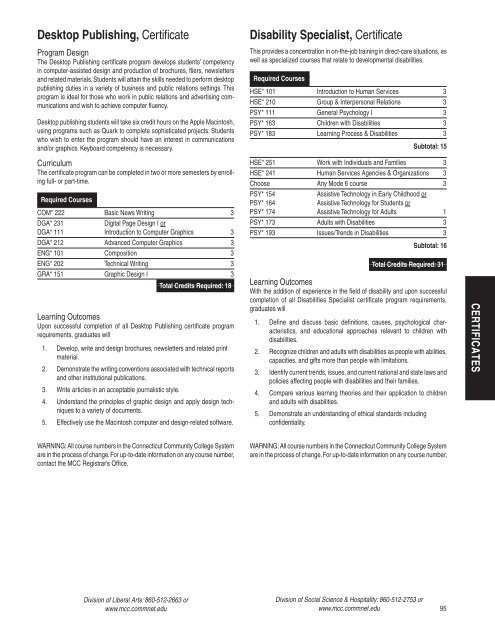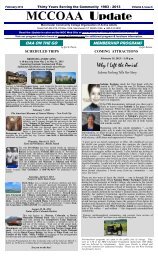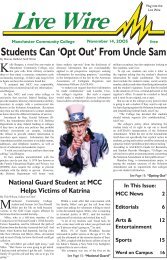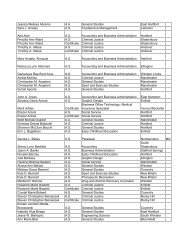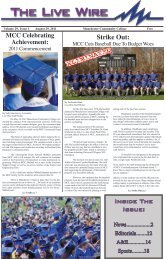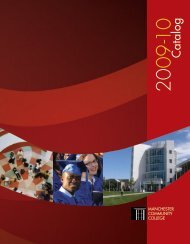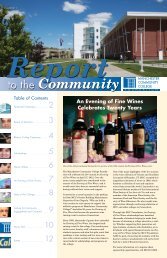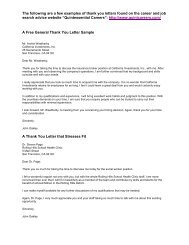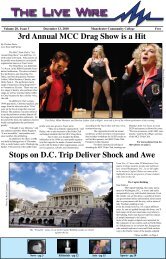Liberal Arts and Science - Manchester Community College ...
Liberal Arts and Science - Manchester Community College ...
Liberal Arts and Science - Manchester Community College ...
You also want an ePaper? Increase the reach of your titles
YUMPU automatically turns print PDFs into web optimized ePapers that Google loves.
Desktop Publishing, Certificate<br />
Program Design<br />
The Desktop Publishing certificate program develops students’ competency<br />
in computer-assisted design <strong>and</strong> production of brochures, fliers, newsletters<br />
<strong>and</strong> related materials. Students will attain the skills needed to perform desktop<br />
publishing duties in a variety of business <strong>and</strong> public relations settings. This<br />
program is ideal for those who work in public relations <strong>and</strong> advertising communications<br />
<strong>and</strong> wish to achieve computer fluency.<br />
Desktop publishing students will take six credit hours on the Apple Macintosh,<br />
using programs such as Quark to complete sophisticated projects. Students<br />
who wish to enter the program should have an interest in communications<br />
<strong>and</strong>/or graphics. Keyboard competency is necessary.<br />
Curriculum<br />
The certificate program can be completed in two or more semesters by enrolling<br />
full- or part-time.<br />
Required Courses<br />
COM* 222 Basic News Writing 3<br />
DGA* 231 Digital Page Design I or<br />
DGA* 111 Introduction to Computer Graphics 3<br />
DGA* 212 Advanced Computer Graphics 3<br />
ENG* 101 Composition 3<br />
ENG* 202 Technical Writing 3<br />
GRA* 151 Graphic Design I 3<br />
Total Credits Required: 18<br />
Learning Outcomes<br />
Upon successful completion of all Desktop Publishing certificate program<br />
requirements, graduates will<br />
1. Develop, write <strong>and</strong> design brochures, newsletters <strong>and</strong> related print<br />
material.<br />
2. Demonstrate the writing conventions associated with technical reports<br />
<strong>and</strong> other institutional publications.<br />
3. Write articles in an acceptable journalistic style.<br />
4. Underst<strong>and</strong> the principles of graphic design <strong>and</strong> apply design techniques<br />
to a variety of documents.<br />
5. Effectively use the Macintosh computer <strong>and</strong> design-related software.<br />
WARNING: All course numbers in the Connecticut <strong>Community</strong> <strong>College</strong> System<br />
are in the process of change. For up-to-date information on any course number,<br />
contact the MCC Registrar’s Office.<br />
Division of <strong>Liberal</strong> <strong>Arts</strong>: 860-512-2663 or<br />
www.mcc.commnet.edu<br />
Disability Specialist, Certificate<br />
This provides a concentration in on-the-job training in direct-care situations, as<br />
well as specialized courses that relate to developmental disabilities.<br />
Required Courses<br />
HSE* 101 Introduction to Human Services 3<br />
HSE* 210 Group & Interpersonal Relations 3<br />
PSY* 111 General Psychology I 3<br />
PSY* 163 Children with Disabilities 3<br />
PSY* 183 Learning Process & Disabilities 3<br />
Subtotal: 15<br />
HSE* 251 Work with Individuals <strong>and</strong> Families 3<br />
HSE* 241 Human Services Agencies & Organizations 3<br />
Choose Any Mode 6 course 3<br />
PSY* 154 Assistive Technology in Early Childhood or<br />
PSY* 164 Assistive Technology for Students or<br />
PSY* 174 Assistive Technology for Adults 1<br />
PSY* 173 Adults with Disabilities 3<br />
PSY* 193 Issues/Trends in Disabilities 3<br />
Subtotal: 16<br />
Total Credits Required: 31<br />
Learning Outcomes<br />
With the addition of experience in the field of disability <strong>and</strong> upon successful<br />
completion of all Disabilities Specialist certificate program requirements,<br />
graduates will<br />
1. Define <strong>and</strong> discuss basic definitions, causes, psychological characteristics,<br />
<strong>and</strong> educational approaches relevant to children with<br />
disabilities.<br />
2. Recognize children <strong>and</strong> adults with disabilities as people with abilities,<br />
capacities, <strong>and</strong> gifts more than people with limitations.<br />
3. Identify current trends, issues, <strong>and</strong> current national <strong>and</strong> state laws <strong>and</strong><br />
policies affecting people with disabilities <strong>and</strong> their families.<br />
4. Compare various learning theories <strong>and</strong> their application to children<br />
<strong>and</strong> adults with disabilities.<br />
5. Demonstrate an underst<strong>and</strong>ing of ethical st<strong>and</strong>ards including<br />
confidentiality.<br />
WARNING: All course numbers in the Connecticut <strong>Community</strong> <strong>College</strong> System<br />
are in the process of change. For up-to-date information on any course number,<br />
Division of Social <strong>Science</strong> & Hospitality: 860-512-2753 or<br />
www.mcc.commnet.edu<br />
95<br />
CERTIFICATES


